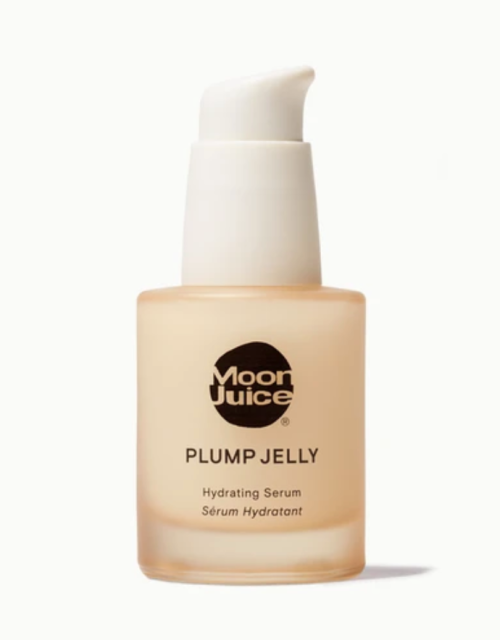Why Your Favorite Wellness Brands Are Vying for Space In Your Beauty Routine
The wellness beauty brands that show that skin care is such a huge part of our routines that everyone wants in on the shelfie.

We happily dole out $50 a month to Moon Juice for supplements, a hundred bucks or more to Lululemon with each leggings purchase, and upwards of $5 a pop for the pleasure of enjoying a singular Lord Jones CBD Gumdrop. As these luxury brands have developed cult followings that grow with every perfectly-packaged wellness launch, they’ve recently bet on something more: That we’ll trust them to whip up the most-coveted beauty and skin-care formulations, too.
The convergence of wellness and beauty is one that has solidified in the past three years, says Maria Steingoltz, a managing director and partner at L.E.K. Consulting, with a decade of beauty and wellness consulting experience. “There’s been a rise in the concept of holistic beauty that includes sleep, exercise, what you’re putting in your body, and what you’re putting on your body in terms of personal care and skin care,” she notes. For brands that have built a strong following by providing one aspect of that wellness journey (be it strappy sports bras or buzzy supplements), moving into the beauty segment can not only mean securing a stronger brand association with a customer’s own health identity, but providing a major payoff for the brand, too. “Skin care is the biggest category within the beauty space overall,” Steingolz says. ‘It’s also the most stable in terms of continuous growth through recessionary time periods.”
Moon Juice founder Amanda Chantal Bacon says her brand’s foray into skin care in 2018 has proven this theory more than she could have imagined. “When Moon Juice opened almost 10 years ago, I would’ve said that I’d be the least likely person to formulate skin care,” she says. But as retailers began asking for skin products and as her own skin care needs started to evolve after hitting her mid-thirties, Bacon made the move. Now the brand’s four-piece skin-care range is among its top 10 best sellers of all time. “Almost 20 percent of our business and 10 percent of our subscription sales are skin care,” she says. “It’s our fastest-growing category.”
Though Moon Juice has seen success with its foray into skin care, Steingoltz says not every lifestyle brand is queued up for the same fluid movement into the $532 billion-dollar beauty space. “Gen Z and millennials, more than anyone, want the ability to edit their own needs,” Steingoltz says. “Expansions into beauty need to be carefully evaluated because not every brand is going to have permission from the consumers. Ultimately, there is an element of curation that is important to this generation of consumers.”
Do today’s leading luxury wellness brands have what it takes to claim top-shelf real estate in our bathrooms? Below, we check in with four cult-worthy wellness companies that specialize in everything from footwear to Sex Dust and are wagering that they can become our skin-care go-tos, too.
Lord Jones Acid Mantle Repair CBD Moisturizer, ($75)
Lord Jones may be most famous for its haute gummies, but the brand’s foray into skin care has helped make it a standout in the bewilderingly oversaturated CBD space. In 2018, it was the first CBD brand sold on Sephora.com with its High CBD Formula Body Lotion ($40). Then, when the company released its multi-purpose Lord Jones Royal Oil ($100) the following year—a formula designed to be taken internally or topically—fans of the brand started using it as a face oil, says Lord Jones co-founder and chief brand officer Cindy Capobianco.
So when the company eased into the facial skin-care game, it wasn’t exactly surprising. What was unexpected is how Lord Jones did it: not with a moisturizer that relies on CBD as its only tentpole, but with one made with a roster of marquee hydrators found in prestige formulations: hyaluronic acid, five ceramides, squalane, sunflower seed oil and, yes, 250mg of full-spectrum hemp-derived CBD oil. It’s a bevy of ingredients that Orit Markowitz, MD, a New York City-based dermatologist and director of pigmented lesions and skin cancer at Mount Sinai Hospital, says can help draw in moisture and boost the skin barrier, too. “Sunflower seed oil is rich in linoleic acid, a fatty acid, which helps maintain the skin barrier and therefore decreases epidermal water loss, while ceramides help seal in moisture allowing for hydration of the skin,” she notes. The result is both practical and luxurious: The heavy-duty cream is geared to bolster the acid mantle (the ultra-fine film on our skin that keeps bacteria, viruses, and environmental gunk from penetrating) while delivering an elegant self-care moment.
Shop: Lord Jones Acid Mantle Repair CBD Moisturizer, ($75)
Birkenstock Natural Skin Care Intense Moisturizing Facial Cream, ($60)
You can dress them up with faux fur or racy metallics, but even after designers like Rick Owens, Phoebe Philo, Carol Lim, and Humberto Leon embraced Birkenstocks, the shoe company hasn’t (and may never) shaken its crunchy, granola image. In fact, that’s something the brand is counting on. Because the shoemaker known for producing naturally-made comfort for more than 200 years is relying on its heritage of natural and clean (and to an extent, good health) to successfully jump into the skin-care world. “It makes sense that the brand is thinking about a natural skin-care line because their consumer is already very attuned to nature,” notes Steingoltz.
This Parisian Skincare Brand Is Launching in the United States for the First Time—Here’s What a Derm Wants You to Know

We’re Calling It: Cleansing Balms Are the Face Wash of the Future—Here Are 3 to Add to Your Cart

This Is the One Product That Scarlett Johansson Always Keeps in Her Purse and on Her Bedside Table

How is it possible to go from foot to face without noticing the jump? The answer has been built into Birkenstock’s foundation all along: cork oak. According to brand research, the same stuff that makes for soothing soles can also pack skin benefits. “Suberin is the key active substance [in cork oak extract] which is clinically proven to increase moisture, strengthen the barrier function and improve smoothness,” says Louise Caldwell, president and general manager of Birkenstock Natural Skin Care in the United States. Though there’s not a ton of outside research on the ingredient, a 2005 study showed it to have a smoothing effect on the skin.
While the brand’s foot cream might seem like the obvious place to start, fans of the brand can’t get enough of the Regenerating Oil for Face and Body ($72) and the Exfoliating Body Scrub ($26). For our money, the refillable Intense Moisturizing Facial Cream proves a super-rich hydrator disguised as a light fluid and the newly launched Anti-Stress Serum ($65) impressively wakes up dull complexions, while packing the lush scent of a redwood forest. What’s more, the Birkenstock footprint isn’t stopping at skin care. “We’re always working to innovate within and beyond our category,” says Caldwell. In fact, the brand has launched cork oak mattresses so we can walk, sleep, and let our skin savor that Birkenstock life.
Shop: Birkenstock Natural Skin Care Intense Moisturizing Facial Cream, ($60)
Lululemon Selfcare Anti-Stink Deodorant, ($18)
Last summer, Meghan Markle’s favorite athleisure brand launched a beauty line for those who live in their leggings. The concept: skin and hair care that makes the transition from a class to brunch a little less harried. Branded as a “sweat-to-life” range (comprising dry shampoo, deodorant, face moisturizer, and lip balm) and geared to counter stinky pits, sweaty hairlines, and flushed faces, the collection has been off to the races.
Why might a brand choose to develop their own beauty line versus collaborating with an established brand (like Glossier did with Equinox)? Steingoltz points out that much like Victoria’s Secret, the athletic-wear brand already has some 50 brick-and-mortar locations, where its enthusiastic customers already flock. If the lifestyle company is outfitting its fans for stylish workouts, why not get in on the next leg of their journey? While we’d love to see a multitasking, hydrating cleansing pad in the travel-sized range (or any facial cleanser for that matter), the spray-on deodorant (made with buzzy ingredients like zinc, coconut oil, and prebiotics) not only works but carries a black pepper sandalwood scent that perfectly straddles the line between earthy and fresh.
Shop: Lululemon Selfcare Anti-Stink Deodorant, ($18)
Moon Juice Plump Jelly Hydrating Serum, ($58)

“Mushroom extracts have anti-inflammatory, antioxidant, and collagen stimulating effects. They have been shown to even skin tone and improve hydration,” says Joshua Zeichner, MD, a New York-based dermatologist and director of cosmetic and clinical research in dermatology at Mount Sinai Hospital. These adaptogenic blends that Moon Juice taps in its dusts are now extending into skin-care products as well (though it’s worth noting that adaptogens have long been used in Traditional Chinese Medicine and Ayurveda to help calm skin irritation).
Miami-based dermatologist S. Manjula Jegasothy, MD, is on board with adaptogenic mushrooms as skin care. “Though we don’t have a lot of clinical research just yet, we think if we grind adaptogenic mushrooms and put the powder into a cream, it can adapt to soothe inflamed skin, reduce redness, and even address acne,” she says. Whether you are a supplement-carrying member of the Moon Juice crew or even subscribe to the power of mushrooms will be moot after you try Acid Potion, the currently-waitlisted adaptogenic answer to Biologique Recherche P50 Lotion, or Milk Cleanse ($32), which lathers without foaming and leaves skin feeling clean, but not tight. Throw in a solid moisturizer and its hydrating serum (which gave our skin a supple bounce and also works as a primer for makeup) and you have what any new beauty brand could hope for: a range that stands on its own as solid skin care.
Sign Up for Our Daily Newsletter
Get all the latest in wellness, trends, food, fitness, beauty, and more delivered right to your inbox.
Got it, you've been added to our email list.







